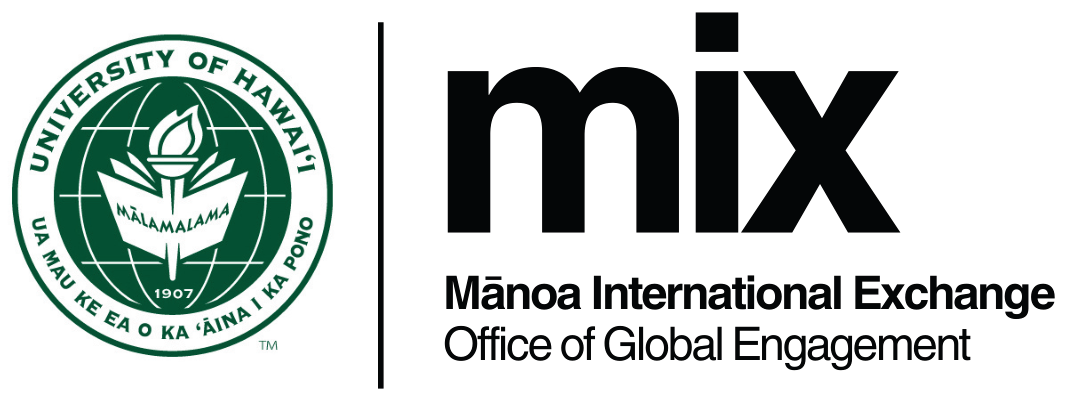Academics
The University of Hawai‘i at Mānoa is the flagship institution of the University of Hawai‘i System. UH Mānoa is a leader in Hawaiian, Pacific, and Asian studies, as well as in fields such as Astronomy, Oceanography, International Business, and Travel Industry Management. Exchange and Visiting students can enroll in a variety of courses across academic areas while studying at UHM.

Course options
Browse the Class Availability page. A variety of course formats are offered: fully in-person, hybrid, and online (asynchronous and synchronous).
Course numbering
- Undergraduate courses (1-499):
- 1-99: Non-degree applicable
- 100-199: Introductory
- 200-299: Second-year
- 300-499: Third- and fourth-year or initial professional courses
- Post-Baccalaureate courses (500-800):
- 500: Directed study
- 500-599: Professional degrees and in-serve training
- 600-699: Graduate courses
- 700-799: Advanced graduate courses
- 800: Dissertation research
Unique course opportunities
Make the most out of your Exchange/Visiting student experience by choosing courses that are unique to Hawaii or unavailable at your home institution:
- Hawaiian (HAW)
- Hawaiian Studies (HWST)
- Natural Resources & Environmental Management (NREM)
- Ocean & Earth Science & Technology (OEST)
- Pacific Island Studies (PACS)
- Peace and Conflict Resolution (PACE)
- Second Language Studies (SLS)
- Travel Industry Management (TIM)
UHM also offers a variety of language courses each semester, including Arabic, Cambodian, Chinese, Filipino, French, German, Hawaiian, Japanese, Korean, Portuguese, Russian, Samoan, Spanish, Thai, Vietnamese, and more.
Top ranked subjects
UH Manoa is consistently ranked among the best national and international universities. UHM is particularly strong in the following subjects:
- Archaeology
- English
- Lingustics
- Languages
- Agriculture
- Psychology
- Geophysics
- Geology
- Earth Science
- Physics and Astronomy
- Geography
- Communication
- Education

Course restrictions
Access to specific courses cannot be guaranteed. Thus, exchange and visiting students should have a flexible study plan with alternate course options in mind. Most courses are open (subject to prerequisites), but some departments may have additional restrictions.
Prerequisites
Departments will review transcripts for prerequisites. Students interested in enrolling in non-introductory coursework (typically 300-level and above) must have completed equivalent courses at their home institution and achieved good grades, as determined by the offering department.
Graduate courses
Exchange and visiting students who are currently enrolled in a graduate-level degree (MSc, MA, PhD, etc.) at their home institution may enroll in graduate courses (generally numbered 500 and above) only with the permission of the faculty teaching the course and/or the host department. Students should be prepared to select alternative courses, as needed.
Language courses
If you are interested in taking a foreign language course while at UHM, a placement exam may be required to determine your level prior to registration, particularly if you plan to take any course above the 100-level. For more information, visit the following pages on Placement Exams and click on the appropriate tab.
Department restrictions
The academic majors listed below are considered “impacted”, which means the department’s courses are in high demand. Availability of courses in these fields will be limited and in certain cases may be restricted by the offering department and/or priority will be given to degree-seeking students at UHM who may require these courses for graduation.
| Department | Notes |
| Academy for Creative Media | Very limited availability. Exchange/visiting students may only be able to enroll in the Intro to Cinema course and cannot choose ACM as their host department. |
| Business |
|
| Dental Hygiene | Not open to exchange/visiting students. |
| Education | Limited availability. Ed Foundations (EDEF), Learning Design & Technology (LTEC), and Ed Psyc (EDEP) may have the most options open to exchange/visiting students. |
| Law | For eligibility and requirements for Fall, Spring, and Summer sessions, please contact the Law School directly: intlaw@hawaii.edu. |
| Medicine | Not open to exchange/visiting students. |
| Music (and Dance) | All MUS 48__ courses are restricted to degree-seeking majors at UHM who have completed three years of composition. MUS 125 and 283 are restricted to degree-seeking Music majors at UHM. Hula/Chant Ensemble courses (MUS/DNCE 312 and 412) also have very limited availability. |
| Nursing | Not open to exchange/visiting students. |
| Travel Industry Management | Exchange/visiting students must complete TIM 101 (or the equivalent) before they are eligible to enroll in a TIM course with TIM 101 as a prerequisite (which is almost all TIM courses). |

